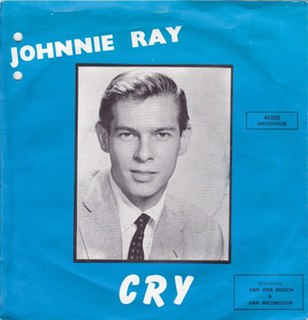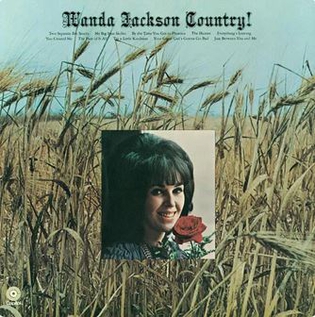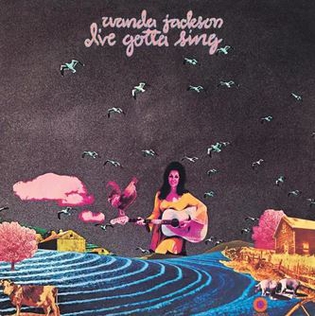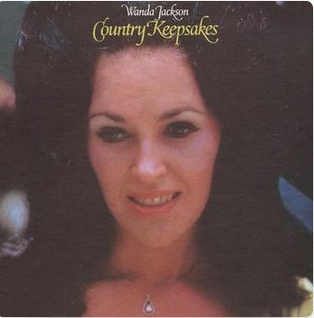
Wanda LaVonne Jackson is an American singer and songwriter. Since the 1950s, she has recorded and released music in the genres of rock, country and gospel. She was among the first women to have a career in rock and roll, recording a series of 1950s singles that helped give her the nickname "The Queen of Rockabilly". She is also counted among the first female stars In the genre of country music.

"Cry" is a 1951 popular song written by Churchill Kohlman. The song was first recorded by Ruth Casey on the Cadillac label. The biggest hit version was recorded in New York City by Johnnie Ray and The Four Lads on October 16, 1951. Singer Ronnie Dove also had a big hit with the song in 1966.
"A Little Bitty Tear" is a song written by the American country songwriter Hank Cochran. It has been recorded by many musical acts, the first being American recording artist Burl Ives. It has since been recorded by others, including Wanda Jackson, Bing Crosby, Chet Atkins, The Shadows and Cochran himself.

The singles discography of Wanda Jackson, an American recording artist, consists of 81 singles, nine international singles, one other charted song, and three music videos. In 1954 at age 16, she signed as a country artist with Decca Records. Her debut single was a duet recording with Billy Gray which reached the eighth spot on the Billboard Hot Country Singles chart, also in 1954. Refusing to tour until completing high school, Jackson's further singles for Decca failed gaining success. She signed with Capitol Records in 1956 and began incorporating rock and roll into her musical style. Jackson's first Capitol single exemplified this format and became a national top-20 country hit. Follow-up rock singles between 1957 and 1959 failed gaining enough attention to become hits including, "Hot Dog! That Made Him Mad", "Fujiyama Mama", and "Honey Bop". In 1960 however, the rock and roll-themed, "Let's Have a Party", became Jackson's first Billboard top-40 pop hit after it was picked up by an Iowa disc jockey.

The albums discography of Wanda Jackson, an American recording artist, consists of 44 studio albums, 37 compilation albums, four live albums, one video album, two box sets and has appeared on 26 albums. In 1954 at age sixteen, Jackson signed with Decca Records as a country music artist. The label did not issue a record until the 1962 compilation Lovin' Country Style, six years after Jackson left Decca. She signed with Capitol Records in 1956, and her self-titled debut studio album was released three years later. Although Jackson had recently been identifying herself as a rock-and-roll performer, the album consisted of country music recordings. However, it did contain Jackson's future rock-and-roll hit "Let's Have a Party", which was a hit in 1960, reaching the Top 40 on the Billboard Pop chart. The success of her rock-and-roll recordings led to the release of two more rock-and-roll studio LPs: Rockin' with Wanda (1960) and There's a Party Goin' On (1961). Additionally, Capitol issued two "split" studio albums which contained rock and roll on one side and country music on the other.
"Right or Wrong" or "Right or Wrong " is a song written and originally recorded by Wanda Jackson, an American country, rock, and Christian music artist. Originally, the song was a major country and pop hit for Jackson in 1961. A second version was released in 1964 that became popular by American pop artist, Ronnie Dove.

Wonderful Wanda is a studio album by American recording artist Wanda Jackson. It was released in August 1962 via Capitol Records and contained 12 tracks. It was the fourth studio album in Jackson's music career and her first to consist entirely of country music songs. Wonderful Wanda included the songs "In the Middle of a Heartache", "A Little Bitty Tear" and "If I Cried Every Time You Hurt Me". All three recordings became commercially-successful singles on both the country and pop charts respectively.

Love Me Forever is a studio album by American recording artist Wanda Jackson. It was released in May 1963 via Capitol Records and contained 12 tracks. It was Jackson's fifth studio album of her career and the second to included orchestrated production. Love Me Forever was a collection of country and pop music standards composed by other artists. The album received positive reviews from critics following its release.

Blues in My Heart is a studio album by American recording artist Wanda Jackson. It was released in April 1965 via Capitol Records and contained 12 tracks. It was the seventh studio album released in Jackson's career and the first to reach the Billboard country chart. The record was a collection of traditional country songs centered around themes of having the blues. It received a positive review from Billboard magazine following its release.

Wanda Jackson Sings Country Songs is a studio album by American recording artist Wanda Jackson. It was released in December 1965 via Capitol Records and contained 12 tracks. The album was Jackson's eighth studio record of her career and consisted of traditional country songs. Seven of these songs were released as singles between 1961 and 1965. Both "Slippin'" and "The Violet and the Rose" reached charting positions on the American country songs survey. The album received a positive review following its original release.

Reckless Love Affair is a studio album by American recording artist Wanda Jackson. It was released in March 1967 via Capitol Records and included 12 tracks. It was Jackson's tenth studio album release and was a collection of songs tailored towards the country music market. Reckless Love Affair included four singles that reached charting positions on the American country chart, including the top 20 hit "Tears Will Be the Chaser for Your Wine". The album itself reached charting positions in the United States and received a positive review following its initial release.

You'll Always Have My Love is a studio album by American recording artist Wanda Jackson, along with her band The Party Timers. It included a total of 12 tracks and was Jackson's eleventh studio album release in her career. It was Jackson's first album that gave credit to The Party Timers. Two singles were included on the album: "Both Sides of the Line" and the title track. The recordings both reached chart positions on the American country chart in 1967, along with the album as well.

Cream of the Crop is a studio album by American recording artist Wanda Jackson and her band The Party Timers. It was released in August 1968 via Capitol Records and contained 12 tracks. It was the twelfth studio album of Jackson's career and her second to give equal billing to The Party Timers. The project included three single releases, all of which reached charting positions on the North American country music sales chart. The album itself also reached charting positions in North America. Cream of the Crop received a positive review following its original release.

The Many Moods of Wanda Jackson is a studio album by American recording artist Wanda Jackson. It was released in December 1968 via Capitol Records and contained 11 tracks. The project was Jackson's thirteenth studio album in her career and spawned two singles. Both "I Wish I Was Your Friend" and "If I Had a Hammer" reached charting positions on the American country chart. The album itself also reached charting positions in the United States.

Wanda Jackson Country! is a studio album by American recording artist Wanda Jackson. It was released in February 1970 via Capitol Records and contained ten tracks. It was Jackson's fifteenth studio album released in her recording career and her fifteen with the Capitol label. The album included four single releases that made chart positions on the American country music survey: "By the Time You Get to Phoenix", "Everything's Leaving", "My Big Iron Skillet" and "Two Separate Bar Stools".

A Woman Lives for Love is a studio album by American recording artist Wanda Jackson. It was released in August 1970 via Capitol Records and contained ten tracks. It was the sixteenth studio album released in Jackson's career and the first to be solely-produced by George Richey. The album's title track, became a top 20 charting single on the American country chart prior to the album's original release. A Woman Lives for Love received a positive review from Billboard magazine in 1970.

I've Gotta Sing is a studio album by American recording artist Wanda Jackson. It was released in February 1971 via Capitol Records and contained ten tracks. It was the seventeenth studio record released in Jackson's career and the seventeen released with the Capitol label. The project included one single release titled "Fancy Satin Pillows", which became a top 20 charting song on the American country music chart. I've Gotta Sing received a positive review from Billboard magazine following its original release.

I Wouldn't Want You Any Other Way is a studio album by American recording artist Wanda Jackson. It was released in September 1972 via Capitol Records and contained ten tracks of country music. The album was Jackson's nineteenth released in her career. Four singles were spawned from the album, including the title track. However, only "Back Then", "I Already Know " and "I'll Be Whatever You Say" placed on the American country music chart. The album would later re-released to digital markets several decades later.

Country Keepsakes is a studio album by American recording artist Wanda Jackson. It was released in March 1973 via Capitol Records and contained ten tracks. The album was Jackson's twenty first studio recording and her final recording issued on the Capitol label. The record was a collection of country songs she made with Capitol to fulfill requirements in her contract before signing with Word Records.

When It's Time to Fall in Love Again is a studio album by American recording artist Wanda Jackson. It was released in 1974 via Myrrh Records and contained ten tracks. It was the first collection of country music recordings released following Jackson's departure from Capitol Records in 1973 and was her twenty-second album in her career. The project included two singles. The second single, "Come on Home ", made chart positions on the American country songs survey in 1974.


















